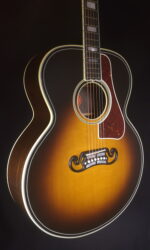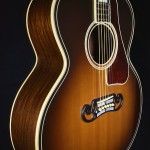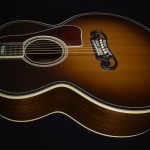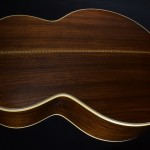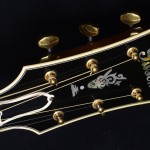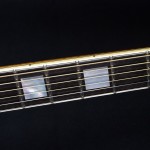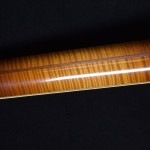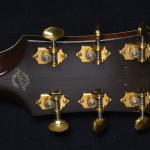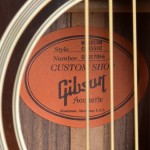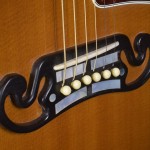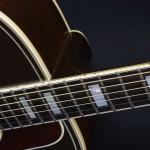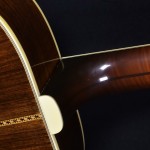Western Classic Prewar 200
The Gibson Western Classic Acoustic Guitar offers just about every luxurious touch Gibson’s luthiers could think of. The Western Classic captures the guitar’s vintage feel perfectly. The exotic woods including a premium solid Sitka spruce top, solid Indian rosewood back and sides, eastern curly maple neck, and ebony fretboard are just the ground work. On top is built one of the most brilliantly ornamented Gibson guitars ever with 4-ply top and back binding, multi-ply fingerboard binding with birdsbeak, moustache bridge, mother-of-pearl graduated block fretboard and bridge inlays, Grover tuners, multi-layer SJ-200 shaped pickguard, 3-rope marquetry, and nostalgic torch headstock inlay. Gibson builds fewer than 30 Western Classic Prewar 200 guitars each year.
This model started production in 1938 as Gibson’s top-of-the-line flat top guitar. It was initially called the Super Jumbo but the name changed in 1939 to the Super Jumbo 200. The name derived from its large 16 7/8″ lower bout, with a double-braced red spruce top and rosewood back and sides and sunburst finish. In 1947 the name changed to the J-200 and the standard back and sides became highly figured maple. Gibson changed the name again in the 1950s to the SJ-200. Due to the depression and the following wartime austerity; demand for this expensive instrument was limited and production quantities were small.
The Gibson Western Classic Prewar 200 is a recreation of the prototype guitar developed for Ray Whitley.
A beautiful instrument that sounds really huge and bright. Really the “King of all Flat Tops.”
Pre-Owned Gibson 2010 SJ 200 Western Classic Pre War Model Features:
- Faded Sunburst Finish
- Solid Sitka Spruce Top
- Solid Indian Rosewood Back and Sides
- Eastern Curly Maple Neck
- Multibound Ebony Fingerboard
- Block Inlays
- Gold Waverly Tuners
- 5-Ply Binding
- 3-Rope Marquetry
- Fishman Natural Pickup
Includes:
- Original Gibson Hard Shell Case
The Gibson name has graced the most innovative and revolutionary acoustic guitars of our times the Super Jumbos, the J-45, the Hummingbird, the Dove. There is no mistaking the classic, period correct mother-of-pearl script logo, pressed onto the face of the headstock. It represents more than a century of originality and excellence. There is simply no equal.Gold Waverly Tuners
Waverly tuners are considered some of the finest in the industry, and that’s why their style and performance are exactly suited for the Custom Western Classic J-200. With a gear ratio of 16:1, these handmade Waverly tuning machines are fitted with solid brass tuner knobs, and feature vintage-style tapered string posts, combining stainless steel with bronze to deliver smooth, non-slip tuning.Historic Flower Pot Peghead Inlay
Early versions of the Gibson’s historic flower pot peghead inlay appeared on some of the earliest Gibson mandolins of the 1910s, and eventually developed into the design used today. This classic inlay has graced the headstocks of many classic Gibson guitars, including the legendary L-5, the Byrdland, and today’s Custom Western Classic J-200.Pickguard
The exclusive, period correct black pickguard on the Custom Western Classic J-200 is modeled after the one designed for the very first J-200, which was built for Ray Whitley one of the original singing cowboys of the 1930s. As with all of Gibson Acoustic’s pickguards, the coloring, inlay, and binding are all done by hand.Rosette
A rosette is the beautiful, hand-crafted circle around the soundhole, and can be one of the most ornamental elements of any acoustic guitar. It is also one of the most subtle and complicated woodworking decorations on any acoustic guitar. The rosette on the Custom Western Classic J-200 is a double-ring rosette, with the main ring consisting of seven-ply binding, and the second ring three-ply binding, adding a stylish, understated elegance to this classic J-200.
Rosewood Fingerboard with Rolled Edges and Block InlaysThe fingerboard of Gibson’s Custom Western Classic J-200 is constructed from Rosewood. The classic block inlays are made of genuine mother of pearl, and are inserted into the fingerboard using a process that eliminates gaps and doesn’t require the use of fillers. The fingerboard also sports a rolled edges instead of the usual right angle where the fingerboard surface meets the neck, Gibson Acoustic’s rolled edges are slightly beveled for an extremely smooth and comfortable feel, enhancing the playability of this J-200.
Body Tonewoods (back, sides and top)
The top of the Custom Western Classic J-200 is made from beautiful AAA-grade Sitka spruce, while the back and sides are constructed from AAA-grade Rosewood, giving the Custom Western Classic J-200 a warmer, richer tone with a booming low end and overall incredible huge sound. Selecting the right wood, and the formula to dry it out, are two of the most central procedures to Gibson’s guitar-building process. Beginning with its first catalog in 1903, Gibson has assured its customers that every guitar would be built using woods with the most durable, elastic, and sonorous qualities,and today’s guitars from Gibson Acoustic are no different.
Radius Top
The top of many flat-top guitars are under a lot of stress from the pull of the strings, which can eventually compromise the top. So, while most acoustic guitars are true flat-top guitars, all of the acoustics produced by Gibson in Bozeman, Montana have a radiused, or tuned top. Instead of being perfectly flat, a radiused or tuned top is raised slightly, and a special instrument is used to shape the top braces to the radius of the top. This process adds tension and strengthens the top, creating a less stressful joint where the top meets the sides and reducing the stresses of string pull. It also results in a “speaker cone†effect that maximizes sound projection, adding a significant boost to mid-range levels for a more balanced acoustic tone.
Bracing
Every acoustic guitar made by Gibson features hand-scalloped, radiused top bracing inside the body, a feature normally found only in limited run, hand-made guitars. By scalloping each brace by hand, the natural sound of the acoustic is focused more toward the center of the body, enhancing the instrument’s sound projection. The lightweight bracing pattern inside the Custom Western Classic J-200 is the same pattern used in Gibson’s first Super Jumbo in 1937 constructed to support and strengthen a very large surface, thus allowing the top more freedom of movement to vibrate and project sound. The placement of the braces inside the Custom Western Classic J-200 also creates powerful, deep lows with full frequency range. The result is the incredibly balanced, huge sound that Gibson’s Super Jumbos are so noted for.

